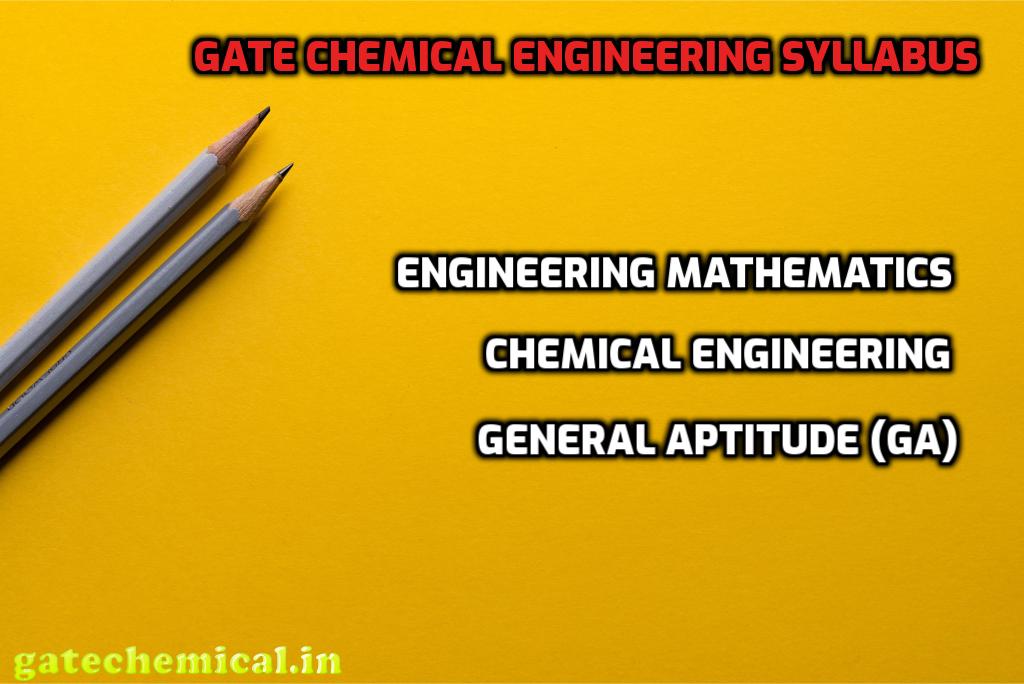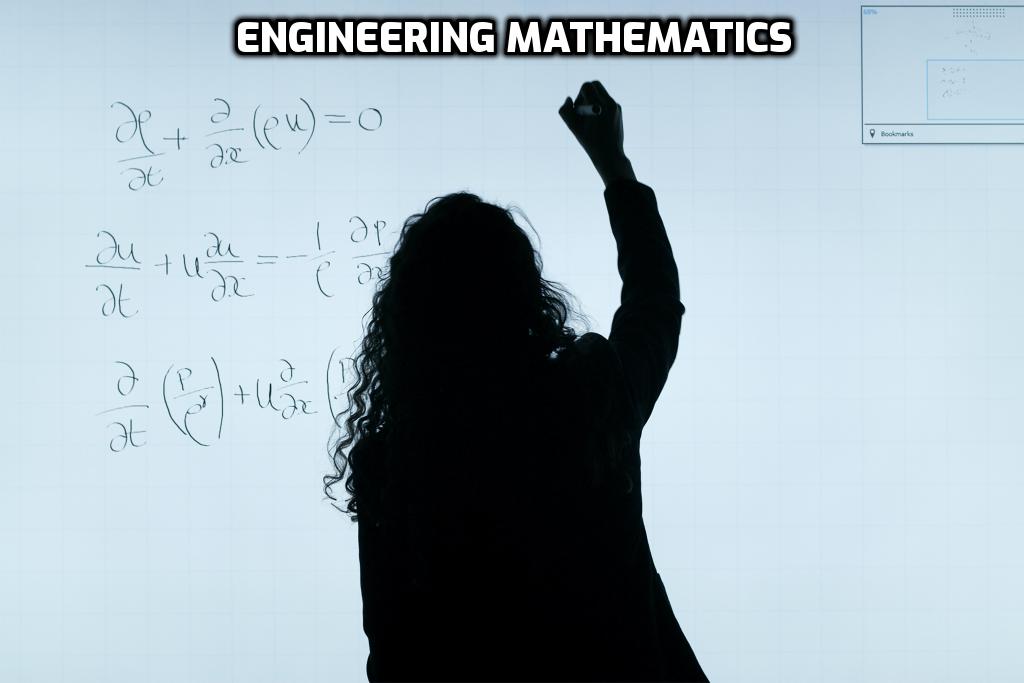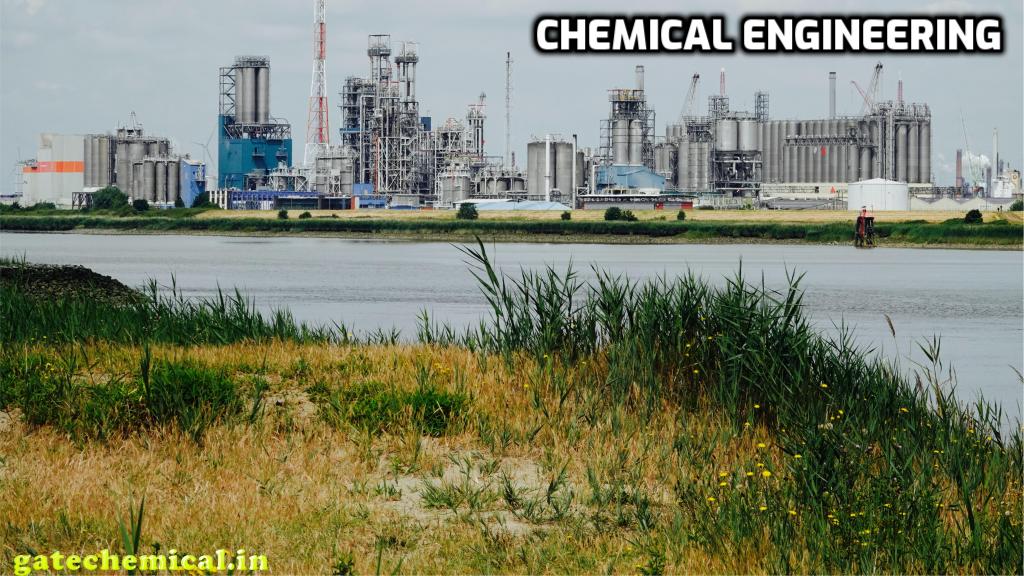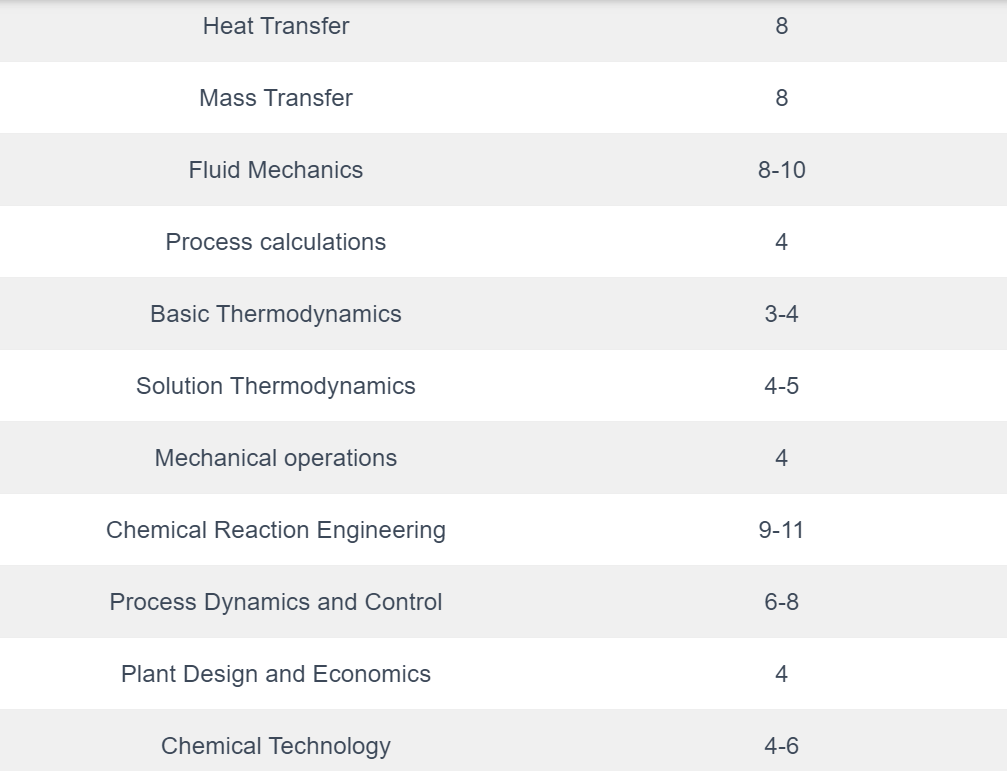GATE 2023 Chemical Engineering Syllabus: If you want to score respectable marks in any exam it is a good strategy to skim through the syllabus of that particular exam because it will give you a sense of confidence.
And in your mind, you will say “Hurray! Yes It’s easy, I can do it”.
gatechemical.in
Once you sow a seed of this success then grabbing a good rank is no way far from you.
GATE 2023 Chemical engineering syllabus broadly covers three parts General Aptitude, Engineering mathematics, and Chemical engineering subjects.

Table of Contents
GATE 2023 Chemical Engineering Examination Pattern
Bonus Tip: in your preparation keep running both General Aptitude, Engineering mathematics side by side as it will boost your rank up.
For GATE 2023 the old exam patter has been revised where new type of questions (MSQs) is introduced.
| Particulars | GATE 2023 Exam Pattern Details |
|---|---|
| Examination Mode | Computer Based Test (CBT) |
| Duration | 3 Hours |
| Type of Questions | (A) Multiple Choice Questions (MCQ) (B) Remaining types 1. Multiple Select Questions (MSQ) and/or 2. Numerical Answer Type (NAT) Questions |
| Questions for testing these abilities | >Recall >Comprehension >Application >Analysis and Synthesis |
| Number of Questions | 10 (GA) + 55 (subject) = 65 Questions |
| Distribution of Marks | General Aptitude: 15 Marks + Engineering Mathematics: 13 Marks + Subject Questions: 72 Marks = Total: 100 Marks |
| Marking Scheme | Questions will be of 1 mark or 2 marks |
GATE Chemical Engineering Syllabus 2023 and important topics
Section 1: Engineering Mathematics

Linear Algebra
- Matrix algebra
- Systems of linear equations
- Eigenvalues and eigenvectors
Calculus
- Functions of single variable,
- Limit,
- continuity and differentiability
- Taylor series
- Mean value theorems
- Evaluation of definite and improper integrals
- Partial derivatives
- Total derivative
- Maxima and minima
- Gradient
- Divergence and Curl
- Vector identities
- Directional derivatives
- Line, Surface and Volume integrals
- Stokes, Gauss and Green’s theorems
Differential equations
- First-order equations (linear and nonlinear)
- Higher order linear differential equations with constant coefficients
- Cauchy’s and Euler’s equations
- Initial and boundary value problems
- Laplace transforms
- Solutions of one-dimensional heat and wave equations
- Laplace equation.
Complex variables
- Complex number
- polar form of complex number
- triangle inequality.
Probability and Statistics
- Definitions of probability and sampling theorems
- Conditional probability
- Mean, median, mode and standard deviation
- Random variables
- Poisson, Normal and Binomial distributions
- Linear regression analysis
Numerical Methods
- Numerical solutions of linear and non-linear algebraic equations
- Integration by trapezoidal and Simpson’s rule
- Single and multi-step methods for the numerical solution of differential equations.
Section 2: Chemical Engineering

Process Calculations and Thermodynamics
- Steady and unsteady state mass and energy balances including multiphase, multicomponent, reacting and non-reacting systems.
- Use of tie components; recycle, bypass and purge calculations
- Gibb’s phase rule and degree of freedom analysis.
- First and Second laws of thermodynamics
- Applications of first law to close and open systems
- Second law and Entropy
- Thermodynamic properties of pure substances: Equation of State and residual properties
- Properties of mixtures: partial molar properties, fugacity, excess properties and activity coefficients
- Phase equilibria: predicting VLE of systems
- chemical reaction equilibrium
Fluid Mechanics and Mechanical Operations
- Fluid statics
- surface tension
- Newtonian and non-Newtonian fluids
- Transport properties
- shell-balances including differential form of Bernoulli equation and energy balance
- Equation of continuity
- equation of motion
- equation of mechanical energy
- Macroscopic friction factors
- dimensional analysis and similitude
- flow through pipeline systems
- velocity profiles
- flow meters
- pumps and compressors
- elementary boundary layer theory
- flow past immersed bodies including packed and fluidized beds
- Turbulent flow: fluctuating velocity, universal velocity profile and pressure drop
- Particle size and shape
- particle size distribution
- size reduction and classification of solid particles
- free and hindered settling; centrifuge and cyclones
- thickening and classification
- filtration
- agitation and mixing
- conveying of solids.
Heat Transfer
- Equation of energy,
- Steady and unsteady heat conduction
- convection and radiation
- thermal boundary layer and heat transfer coefficients
- boiling, condensation and evaporation
- types of heat exchangers and evaporators and their process calculations
- Design of double pipe, shell and tube heat exchangers, and single and multiple effect evaporators.
Mass Transfer
- Fick’s laws
- molecular diffusion in fluids
- mass transfer coefficients
- film, penetration and surface renewal theories
- momentum, heat and mass transfer analogies
- stage-wise and continuous contacting and stage efficiencies
- HTU & NTU concepts
- design and operation of equipment for distillation, absorption, leaching, liquid-liquid extraction, drying, humidification, dehumidification and adsorption
- membrane separations (microfiltration, ultra-filtration, nano-filtration and reverse osmosis).
Chemical Reaction Engineering
- Theories of reaction rates
- kinetics of homogeneous reactions
- interpretation of kinetic data
- single and multiple reactions in ideal reactors
- non-ideal reactors
- residence time distribution
- single parameter model
- non-isothermal reactors
- kinetics of heterogeneous catalytic reactions
- diffusion effects in catalysis
- rate and performance equations for catalyst deactivation
Instrumentation and Process Control
- Measurement of process variables
- sensors and transducers
- P&ID equipment symbols
- process modeling and linearization
- transfer functions and dynamic responses of various systems
- systems with inverse response
- process reaction curve
- controller modes (P, PI, and PID)
- control valves
- transducer dynamics
- analysis of closed-loop systems including stability
- frequency response
- controller tuning
- cascade and feedforward control.
Plant Design and Economics
- Principles of process economics and cost estimation including depreciation and total annualized cost
- cost indices
- rate of return
- payback period
- discounted cash flow
- optimization in process design and sizing of chemical engineering equipment such as heat exchangers and multistage contactors.
Chemical Technology
- Inorganic chemical industries (sulfuric acid, phosphoric acid, Chlor-alkali industry)
- fertilizers (Ammonia, Urea, SSP and TSP)
- natural products industries (Pulp and Paper, Sugar, Oil, and Fats)
- petroleum refining and petrochemicals
- polymerization industries (polyethylene, polypropylene, PVC and polyester synthetic fibers).
Section 3: General Aptitude (GA)
The following image is self-evident about the general aptitude for GATE 2022.

Did you get something?
If you get the point that I want to illustrate by using the above image, please comment below what you get and share this with your friends and ask if they are wise enough like you.
Verbal Aptitude
- Basic English grammar:
- Tenses
- articles
- adjectives
- prepositions
- conjunctions
- verb-noun agreement and other parts of speech.
- Basic vocabulary:
- words
- idioms, and phrases in context Reading,
- Comprehension and Narrative sequencing
Quantitative Aptitude
- Data interpretation
- data graphs (bar graphs, pie charts, and other graphs representing data)
- 2- and 3-dimensional plots, maps, and tables
- Numerical computation and estimation
- ratios
- percentages
- powers
- exponents and logarithms
- permutations and combinations, and series.
- Mensuration and geometry
- Elementary statistics and probability
Analytical Aptitude
- Logic
- deduction and induction Analogy
- Numerical relations and reasoning
Spatial Aptitude
- Transformation of shapes
- translation, rotation, scaling, mirroring, assembling, and grouping Paper folding, cutting, and patterns in 2 and 3 dimensions.
Here is updated general aptitude syllabus for gate 2023.
GATE 2021 syllabus for Chemical Engineering pdf
Source: Official website of GATE 2021 IIT Bombay.
Important Topics: GATE Chemical engineering syllabus 2023
I have listed the complete Chemical engineering syllabus for GATE 2023 but how the GATE exam gives its weightage to all. After doing research over the last few years’ GATE Chemical engineering question papers I have prepared a GATE Chemical Engineering subject wise weightage chart below.

Best Reference Books GATE 2023 Chemical engineering syllabus
The best key to cover the complete GATE Chemical engineering syllabus is the practice of last years question papers. Any question you couldn’t solve with your existing knowledge, upgrade your concept knowledge as per the syllabus requirement. You can write below if you need more specific insight in self-preparation Tips
| GATE 2023 syllabus section | Book Name | Best Self GATE preparation Tips |
|---|---|---|
| Engineering Mathematics | Higher Engineering Mathematics by B. S. Grewal | Just brush up concepts then Practice last 20 years Engineering Mathematics questions of all branches(ME,CE etc) |
| General Aptitude | RS Agarwal – Quantitative Aptitude + Logical Reasoning, CAT preparation book by Arun Sharma | Practice of Last 20 years General Aptitude questions from all GATE subjects are more than enough. For English start reading News papers and current affair magazines(will fetch you manifold benefits). |
| Chemical Engineering | GATE Chemical Engineering: A Text Book by Ram Prasad (Author) | Analyze last 10 years question papers. Solve as many question you can. where ever you stuck revise your concept and practice question on that Concept. |
Also check: A complete guide on Best GATE Chemical engineering books
FAQ: GATE Chemical Engineering Syllabus 2023
Yes, Definitely, Making your career in Chemical Engineering is a good career option because It opens many doors for you in the field of Oil and gas, Fertilizers, Food and beverages, Research and Development, space research industry and many more. You name the industry a Chemical Engineer can work there.
GATE exam syllabus is designed in a pattern that it covers Engineering Mathematics, General Aptitude, and Engineering Subject knowledge.
GATE 2022 Chemical engineering syllabus consists of 3 sections, Engineering Mathematics, General Aptitude, and Core Chemical Engineering subjects. Chemical Engineering subjects carries 70 marks out of 100.
Yes, It changed but minor changes are made in it. You don’t have to be worried about it because we have presented Updated GATE 2021 Chemical engineering syllabus here.
No, GATE is not compulsory for M Tech. There are many other ways to get an admission in IITs and NITs. IIT provide opportunity to many B Tech students from IITs who have secured specified marks in their B Tech to apply for M Tech admission. If you are seeking a stipend from MHRD you must have a valid GATE score card.
There is no limit to attempts for GATE exam. You can attempt GATE as many times as you want.

0 Comments